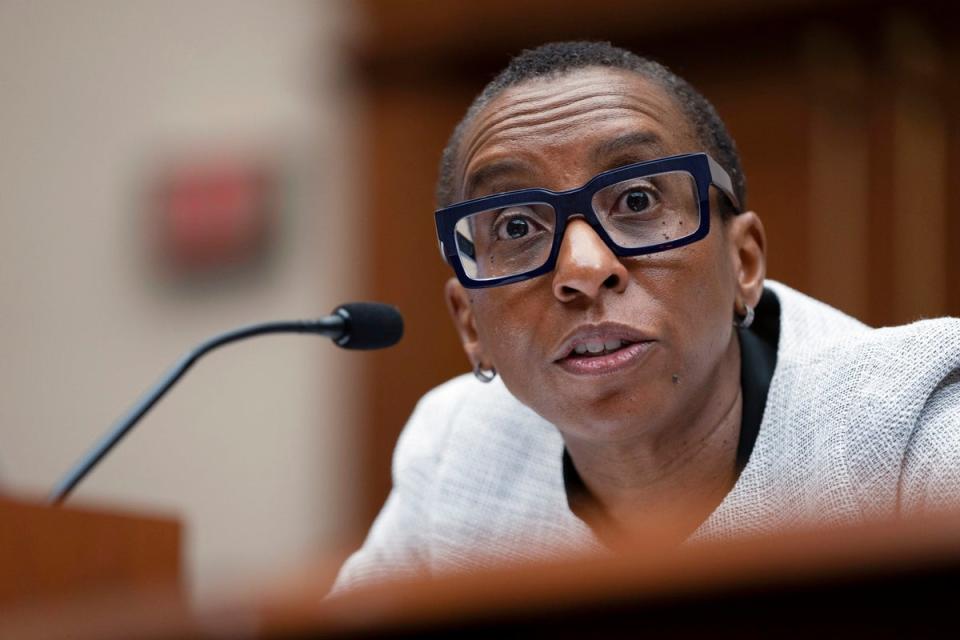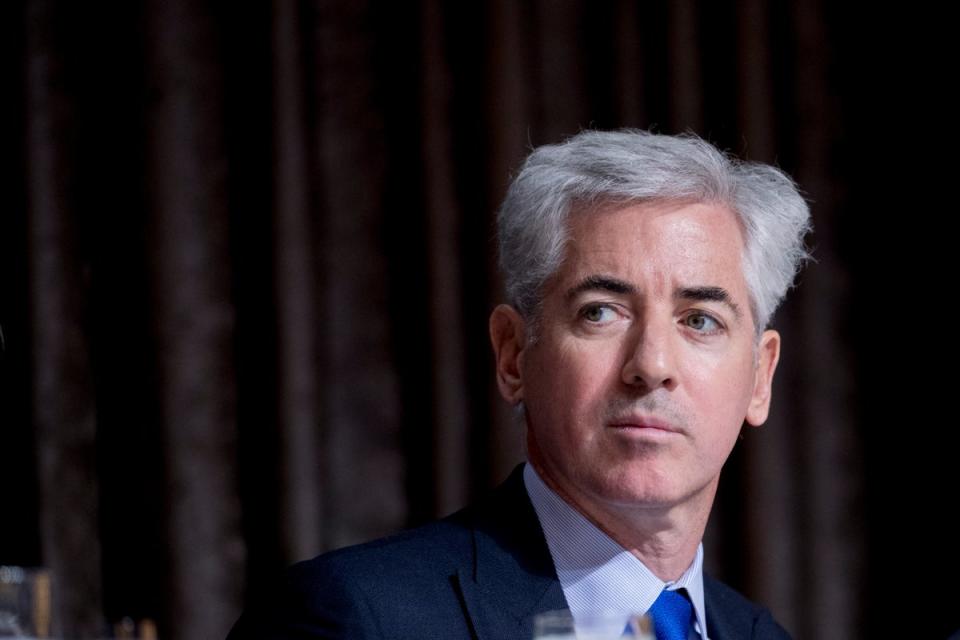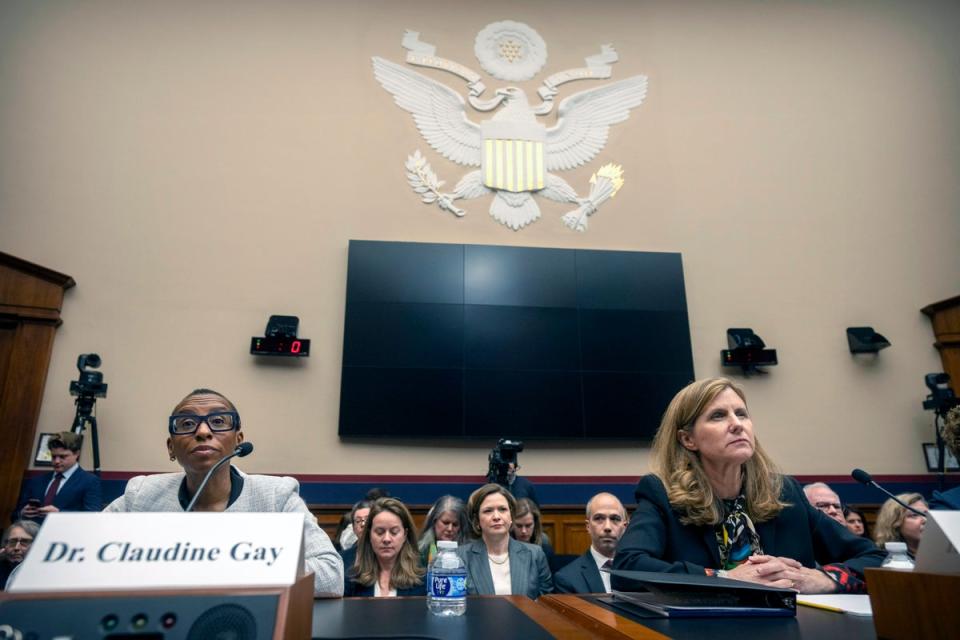Harvard president survives calls for removal after antisemitism hearing
Harvard president Claudine Gay has survived calls for her removal, following a row over her appearance at a congressional hearing on antisemitism last week.
The university’s highest governing body released a statement on Tuesday throwing their unanimous support behind the college president, calling her the “right leader to help our community heal”.
It comes after Ms Gay, University of Pennsylvania president Liz Magill and MIT president Sally Kornbluth all appeared in front of the House Committee on Education and the Workforce last week to testify about their colleges’ responses to alleged incidents of antisemitism on campuses since the start of the Israel-Hamas war.
All three university presidents have faced backlash for what critics described as their “inaction” over alleged antisemitism on campus following the 7 October surprise attack by Hamas on Israel – which saw 1,400 Israelis killed.
The three then roused further controversy when, during the congressional hearing, they failed to explicitly say that calling for the genocide of Jews would violate their colleges’ harassment and bullying codes.
Instead, they took the stance that it ”depends on the context” – something all three presidents later apologised for.
Ever since, pressure has been mounting on all three to be ousted from the helm of their colleges with a bipartisan group of lawmakers sending a letter to the governing boards of Harvard, UPenn, and MIT calling for their removal.
Ms Magill became the first of the presidents to resign over the weekend, announcing her departure and apologising for her remarks after UPenn alum and Wall Street CEO Ross Stevens threatened to strip the university of a $100m donation if she did not step down.
But Ms Gay and Ms Kornbluth have so far survived attempts to oust them from their roles, with Harvard’s governing board deciding to keep Ms Gay as the university’s president following closed-door board discussions, the Harvard Crimson reported.
The university announced the decision in a statement on Tuesday morning.
“As members of the Harvard Corporation, we today reaffirm our support for President Gay’s continued leadership of Harvard University,” the statement, signed by all of the board members other than Ms Gay, said.
“Our extensive deliberations affirm our confidence that President Gay is the right leader to help our community heal and to address the very serious societal issues we are facing.”

The New York Times had previously reported that she was set to survive the scandal, while Harvard alum and billionaire hedge fund CEO Bill Ackman also posted on X that he had heard – citing “a source I trust” – that Ms Gay would “not resign” and that the governing board had decided not to terminate her as president.
He added that he had also been told by “two reporters” that “one of the factors that made it challenging for the @Harvard board to fire Gay was that they were concerned it would look like they were kowtowing to me”.
Mr Ackman has been one of the most vocal critics demanding that Ms Gay “resign in disgrace” over the antisemitism hearing row.
“As a result of President Gay’s failure to enforce Harvard’s own rules, Jewish students, faculty and others are fearful for their own safety as even the physical abuse of students remains unpunished,” Mr Ackman wrote in an open letter to Harvard’s governing board on Sunday.
“Knowing what we know now, would Harvard consider Claudine Gay for the position? The answer is definitively “No.” With this simple thought experiment, the board’s decision on President Gay could not be more straightforward,” he wrote.
Mr Ackman has in fact been one of Ms Gay’s loudest critics since she became Harvard’s first Black president in July.
He previously questioned the 53-year-old’s academic integrity and values, posting content on social media that implies she was hired to fulfil diversity metrics.
He has also previously promoted an article from Chris Rufo, a conservative activist who spearheaded a right-wing campaign against critical race theory in elementary schools, that claims Ms Gay plagiarised parts of her thesis.
Pressure had also been mounting for Ms Gay’s removal from others since the congressional hearing.
A letter expressing “no confidence” in Ms Gay, signed by Harvard students, staff and alumni, had gained support in the last week.
The letter urged Ms Gay to resign or be relieved of her position. “It is not appropriate for Claudine Gay to serve as President of Harvard, as she does not represent our collective values or the Harvard that we have come to know,” the letter said.

While some had celebrated the pressure campaign from the likes of Mr Ackman, others, including some faculty and students at the universities on his radar, had expressed dismay about the considerable influence he and other well-connected outsiders were exerting over educational institutions, and had given their support to Ms Gay.
In recent days, more than 700 Harvard faculty members signed various letters calling on the administration not to remove Ms Gay as president because “defending a culture of free inquiry in our diverse community cannot proceed if we let its shape be dictated by outside forces”.
“We, the undersigned faculty, urge you in the strongest possible terms to defend the independence of the university and to resist political pressures that are at odds with Harvard’s commitment to academic freedom, including calls for the removal of President Claudine Gay,” one of the letters read.
Professor Ryan Enos, who signed one of the letters, told The Boston Globe that “there is agreement [among faculty] that it’s wrong to have politicians and alumni pressuring who should be the president of the university”.
Ms Gay’s support has come from a diverse range of faculty, according to The New York Times, including Jewish professors and Arab American and Muslim faculty members.
The Executive Committee of Harvard University’s Alumni Association also announced its unreserved support for Ms Gay on Monday.
“President Gay is the right leader to guide the University during this challenging time,” the committee wrote in a letter to school officials.
“She is thoughtful. She is kind. She is resolutely dedicated to the growth and wellbeing of our very diverse community. We recognize that there was disappointment in her testimony this past week. President Gay has pointed this out and apologized for any pain her testimony caused–a powerful demonstration of her integrity, determination, and courage.”
The scandal began almost immediately after the Hamas attacks on Israel, when a group of 33 Harvard student organisations, led by the Harvard Undergraduate Palestine Solidarity Committee, released a now-deleted statement on social media arguing that Israel’s “apartheid regime” had created the impetus for the war.

The letter, published on the same day as the 7 October attacks, prompted furious backlash, with Harvard professors and alumni calling on the university’s leadership to condemn the letter as well as Hamas.
Mr Ackman also called for the signators of the letter to be blacklisted from top Wall Street firms – a move he came under fire for after a truck appeared near the Harvard campus, circling the university and displaying photos of Harvard students and organisations allegedly linked to the original statement.
Ms Gay issued a statement three days after the letter was published condemning the attacks and distancing the university’s leadership from the letter.
Meanwhile, in a speech at Harvard’s Jewish student organisation in late October, she announced that she had assembled an advisory group of “faculty, staff, alumni, and religious leaders from the Jewish community” who “will help us to think expansively and concretely about all the ways that antisemitism shows up on our campus and in our campus culture”.
While Ms Gay has seemingly done enough to keep her job for now, questions still remain as to what her fate will be in the future.

 Yahoo News
Yahoo News 
